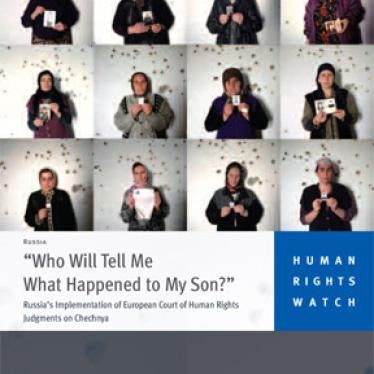(Moscow) - The Russian authorities should investigate the arbitrary detention of three human rights advocates in Chechnya and hold those responsible accountable, Amnesty International, Civil Rights Defenders, Front Line, and Human Rights Watch said today. The organizations called on the government to ensure a safe working environment for human rights organizations in Chechnya, as Prime Minister Vladimir Putin promised in January 2010.
Three members of the Joint Mobile Group of Russian Non Governmental Organizations, a group established to monitor human rights in Chechnya, were investigating a human rights violation case in the Shali district when they were detained by Shali police at approximately 7:30 p.m. on February 7th. They were held overnight and released only around 10 the next morning, though there appeared to be no official processing of their detention. Under Russian legislation, detention for an identity check is permitted for a maximum of three hours but anytime beyond that it unlawful.
"This arbitrary detention clearly demonstrates that the Chechen law enforcement agencies continue harassing human rights defenders despite Prime Minister Putin's recent call for a healthy working environment for human rights groups," said Holly Cartner, Europe and Central Asia director at Human Rights Watch.
The three activists - Dmitry Egoshin of Man and Law, Marii-El Republic; Roman Veretennikov, of Mothers for the Rights of Persons in Custody, Krasnodar Region; and Vladislav Sadykov, Bashkir Chapter of the Inter-regional Committee Against Torture - were responding to a phone call from a Shali resident, who suggested that they interview an alleged witness to a human rights violation.
When they arrived at the arranged meeting place, Veretennikov and Sadykov left the car while Egoshin waited. A man approached and asked them to follow him. A car drove up and several policemen got out and insisted the two men get in the vehicle. One of the policemen introduced himself as the head of the Shali district police. Despite their protests, Veretennikov and Sadykov were taken to the Shali police station. Other policemen approached Egoshin some time later and forced him to accompany them to the police station.
At the station, the police separated the three men and questioned them individually about their activities and the case they were working on in Shali. They were not given access to a lawyer, but they were allowed to make several phone calls to colleagues outside of Chechnya. The questioning lasted all night though the activists agreed to provide only general information about the work of their organizations. The men were told that they were not under arrest but that they were not allowed to leave. The police did not appear to process their detention officially and did not write a protocol of the questioning.
On January 23 this year, Prime Minister Putin urged authorities in the North Caucasus to "do everything to support the normal work and daily activities of rights-defending organizations" in the region.
The Joint Mobile Group in Chechnya works under the Public Commission on Chechnya, a coalition created by 12 Russian human rights organizations following a wave of killing of activists in the region. The group investigates crimes carried out with the alleged involvement of local officials. It established a permanent presence in Chechnya in early November 2009, with human rights defenders from various Russian regions travelling to Chechnya on rotation. The Mobile Group viewed the detentions of its three members as an attempt at intimidation.
"With local activists in Chechnya extremely vulnerable to violent attacks and even killings, it is of vital importance for their colleagues from different regions of Russia to support their efforts," said Mary Lawlor, director of Front Line. "We regard the unlawful detention of three Russian activists as an attempt by law enforcement agencies to force the Mobile Group to stop its work."
In a comment to the press on the detention, the Ministry of Internal Affairs for Chechnya said a local resident had complained that the activists coerced her to provide false information against local law enforcement. The police told the activists the same thing and they flatly denied the allegations.
The activists reported that the head of Shali police, Magomed Daudov, personally arranged the detention. While they were in custody, Shali police officers searched their car. A video-recording device was removed from the car, severely damaged, and returned to them in the morning with all information deleted from it. The police also seized the activists' dictaphone and deleted all their files from it. It is unclear whether the police reviewed any of the files or made their own copies.
Igor Kalyapin, the head of the Inter-regional Committee Against Torture, a human rights organization with headquarters in Nizhni Novgorod, and one of the founders of the Public Commission on Chechnya, reported that when he called the Shali police at 1:30 a.m. to ask why his colleagues were being held, a night shift officer said the three men had not been officially detained. However, when asked if they were free to leave, the officer said that they could not because they were subject to investigative activities.
"This unlawful detention must be investigated thoroughly and officials responsible for this clear breach of Russian and international law should be held to account," said Halya Gowan, Europe and Central Asia program director at Amnesty International.
Human Rights Watch, Front Line, Amnesty International, and Civic Rights Defenders urge the prosecutor general of the Russian Federation to investigate this incident and to hold the officials involved to account for the detention and destruction of the Mobile Group's property and audio and video records. The groups further called on the federal authorities to guarantee that their regional counterparts comply with Mr. Putin's commitment to maintain a working environment for independent rights groups that is safe and free from interference.







